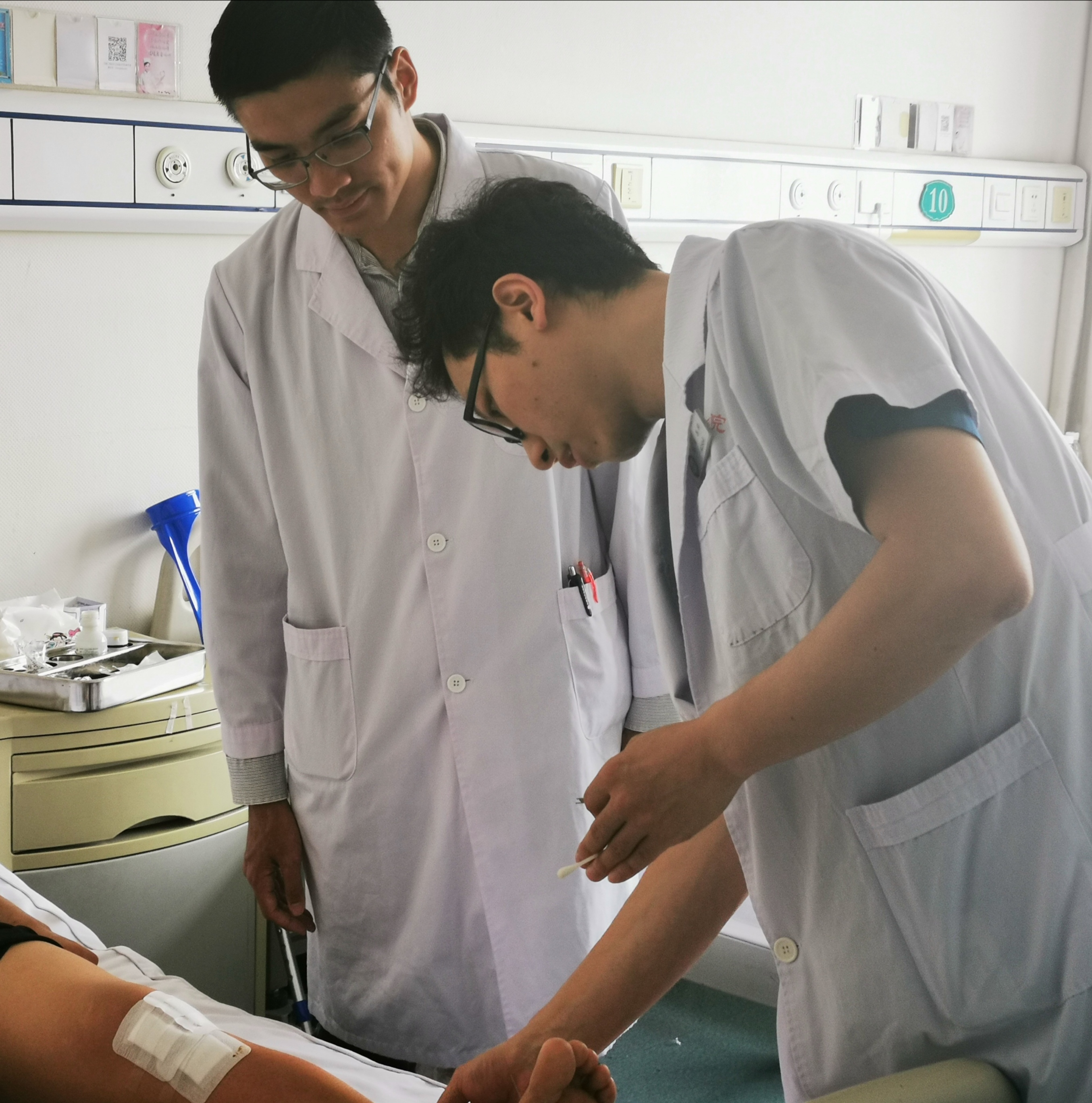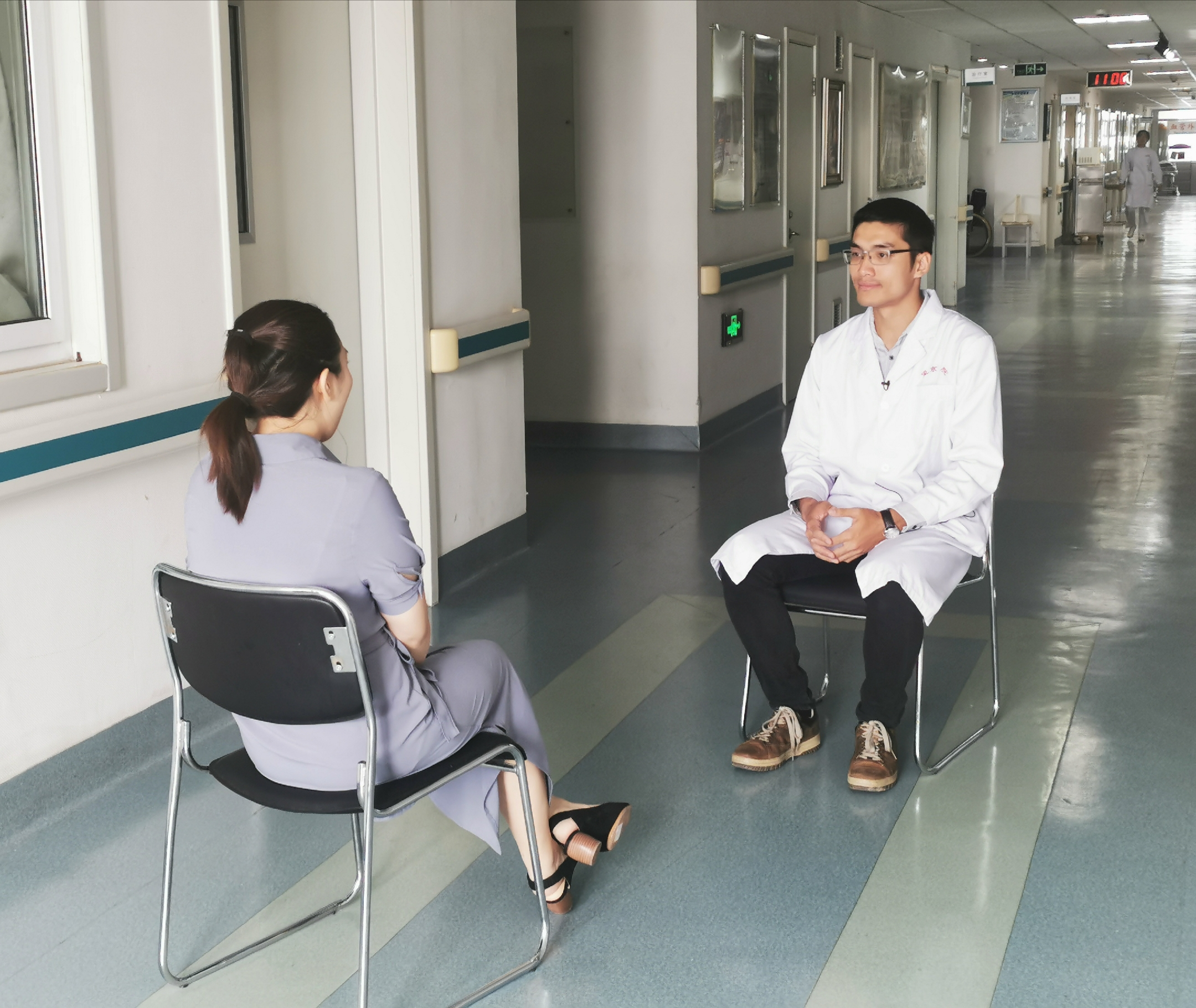

The current situation in the Hong Kong Special Administrative Region hasn't stopped the people-to-people exchanges between compatriots from the Chinese mainland and the region. Having evolved for over thousands of years, Traditional Chinese Medicine (TCM) enjoys recognition around the world. It is equally popular in the Chinese mainland and HKSAR, and it is now connecting the young people.
Wong Chor Fung's day starts with a regular tour of inpatient wards at a major public hospital in the Chinese capital of Beijing. But as a traditional Chinese medicine practitioner, who has previously worked at Hong Kong's TCM clinics, this is a brand new experience for him.

Wong Chor Fung (L), Hong Kong-based registered Chinese medicine practitioner, learns new skills at Wangjing hospital of the China Academy of Chinese Medical Sciences, in Beijing, as part of a one-year exchange program. /CGTN Photo
"The philosophies behind TCM remain the same, but what's different between Hong Kong and the mainland is the medical model for TCM. In Hong Kong, our Chinese medicine treatment still focuses on the outpatient service and we are all general practitioners instead of specialized doctors. At the same time, hospitals in the mainland usually integrate TCM therapies with Western medicine," said Wong Chor Fung, Hong Kong-based registered Chinese medicine practitioner, who's now learning new skills in Beijing.
Wong Chor Fung is one of the 10 Chinese medical practitioners from Hong Kong who have been chosen by Hong Kong's health authorities for a one-year medical exchange program. It's a program that has been running for over a decade. The Hospital Authority, which manages all public hospitals in Hong Kong, has joined hands with three mainland hospitals featuring their renowned TCM therapies, while offering full scholarships to the candidates.

Wong Chor Fung shares his work and life experience in the Chinese mainland with CGTN. /CGTN Photo
Wong Chor Fung picked Wangjing Hospital, which is affiliated to the China Academy of Chinese Medical Sciences (CACMS) and specializes in orthopedics. Now he's working with doctors in the joint surgery and sports medicine department. His mentor Jiang Bo has witnessed the differences in TCM development in different regions and he fully understands the need to continue exchanges like this.
"Based on Wong Chor Fung's solid background in Chinese medicine, we teach him a combination of TCM and western-style treatments, especially in the post-surgery recovery for our patients. Compared with the north, TCM culture has deeper roots in southern China like in Hong Kong. That's what we in Beijing could learn from," said Jiang Bo, an attending physician at Beijing-based Wangjing hospital.

Wong Chor Fung is no stranger to the Chinese mainland. He gained a bachelor's degree at Tianjin University of Traditional Chinese Medicine in 2015. /Photo courtesy of Wong Chor Fung
The young Hong Kong resident is no stranger to the mainland. Four years ago, he gained an undergraduate degree at Tianjin University of Traditional Chinese Medicine.
"My family in Hong Kong told me if you want to study Chinese medicine, you should go back to the mainland for broader and more authentic understanding. So, I studied in the city of Tianjin for five years. I was surprised by the huge differences between the northern and southern parts of China. Previously, I thought all regions above Guangdong Province are considered the north, and I even couldn't speak mandarin well at first. But as time went by, I gradually got used to the life here," Wong Chor Fung recalled his campus life in Tianjin.
Wong Chor Fung added that he's already obtained licenses for practicing TCM both in the mainland and Hong Kong. So in the future, he's hoping not to get confined to just one of the two, and act as a bridge to connect them and better introduce Traditional Chinese Medicine (TCM) to the world.

Copyright © 2018 CGTN. Beijing ICP prepared NO.16065310-3
Copyright © 2018 CGTN. Beijing ICP prepared NO.16065310-3